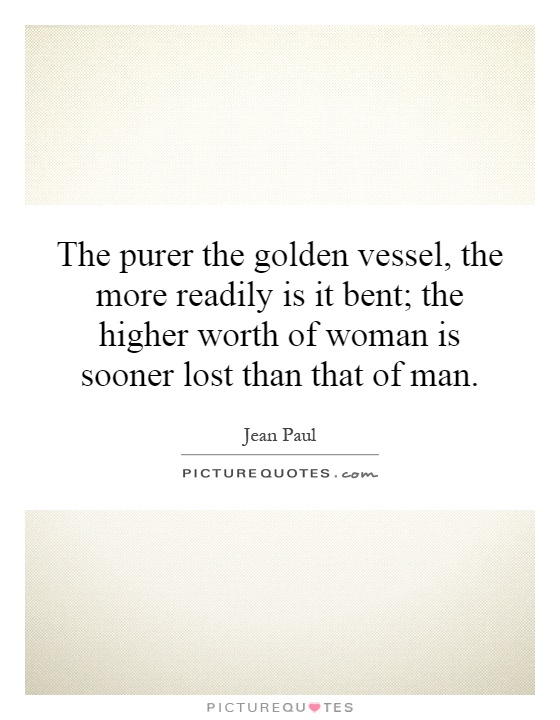The purer the golden vessel, the more readily is it bent; the higher worth of woman is sooner lost than that of man

The purer the golden vessel, the more readily is it bent; the higher worth of woman is sooner lost than that of man
In the context of Jean Paul, a German Romantic writer known for his philosophical and satirical works, the quote "The purer the golden vessel, the more readily is it bent; the higher worth of woman is sooner lost than that of man" can be interpreted in various ways. Jean Paul was known for his deep insights into human nature and society, and this quote reflects his views on gender roles and societal expectations.One possible interpretation of this quote in the context of Jean Paul's work is that women are often held to higher standards of purity and virtue than men, and as a result, they are more easily judged and criticized for any perceived flaws or mistakes. In a patriarchal society like the one Jean Paul lived in, women were expected to be pure, chaste, and submissive, while men were allowed more freedom to make mistakes and take risks without facing the same level of scrutiny.
Furthermore, the idea that the worth of a woman is more easily lost than that of a man could be seen as a commentary on the unequal treatment of women in society. Women were often seen as property or objects to be owned and controlled by men, and any deviation from societal norms could result in their worth being diminished in the eyes of others. This double standard placed a heavy burden on women to conform to rigid expectations and limited their ability to express themselves freely.
Additionally, the comparison of a golden vessel being bent to the worth of a woman being lost could also suggest that women are more vulnerable to external pressures and influences that can shape their identities and worth. Just as a golden vessel can be easily manipulated or damaged, women may be more susceptible to societal norms and expectations that can diminish their sense of self-worth and agency.
Overall, in the context of Jean Paul's work, this quote highlights the unequal treatment of women in society and the challenges they face in maintaining their worth and identity in a world that often seeks to control and diminish them. It serves as a powerful reminder of the need for gender equality and the importance of recognizing and valuing the worth of all individuals, regardless of their gender.












 Friendship Quotes
Friendship Quotes Love Quotes
Love Quotes Life Quotes
Life Quotes Funny Quotes
Funny Quotes Motivational Quotes
Motivational Quotes Inspirational Quotes
Inspirational Quotes